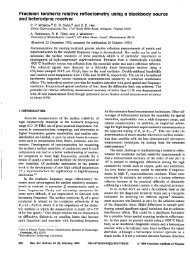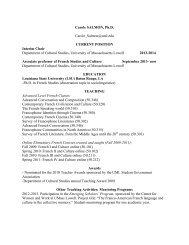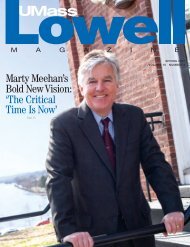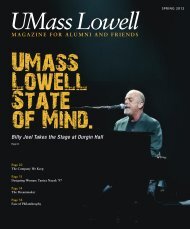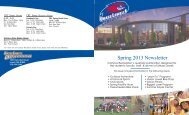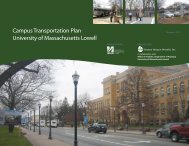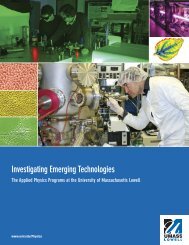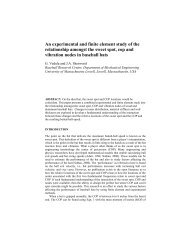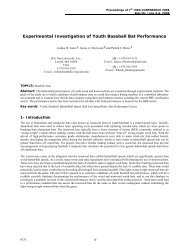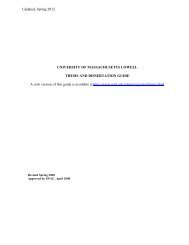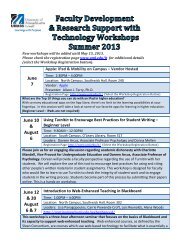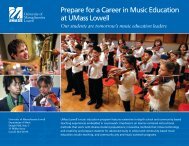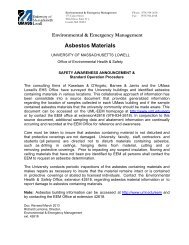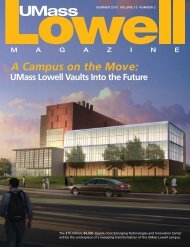Summer 2011 - University of Massachusetts Lowell
Summer 2011 - University of Massachusetts Lowell
Summer 2011 - University of Massachusetts Lowell
You also want an ePaper? Increase the reach of your titles
YUMPU automatically turns print PDFs into web optimized ePapers that Google loves.
F E A T U R E S T O R Y<br />
GOOGLE PARTNER HONED<br />
HIS ENTREPRENEURIAL<br />
INSTINCTS AT UMASS LOWELL<br />
Pr<strong>of</strong>. Emeritus Pat Krolak remembers sitting at Logan<br />
Airport, getting ready to board an airplane to<br />
Pennsylvania, and waiting anxiously for his grad<br />
student Rich Miner. As part <strong>of</strong> their work for<br />
the Center for Product Enhancement, the pair<br />
were due in Philadelphia, where they were<br />
scheduled to make a pitch to the Commodore<br />
and Amiga group.<br />
Miner had been working on their presentation throughout<br />
the night – and still had it in his possession – but he was<br />
nowhere in sight.<br />
“Our plane was leaving in 45 minutes and there was<br />
still no sign <strong>of</strong> Richard at Logan Airport,” recalls Krolak.<br />
“I called him and it turned out he was still packing things<br />
into his car at <strong>Lowell</strong>. I said, ‘Richard, the plane is about<br />
to leave.’ And he said, ‘Sure, I have plenty <strong>of</strong> time.’”<br />
Krolak says a lot <strong>of</strong> money was at stake – and he was<br />
nervous.<br />
“About five minutes before the plane’s door was to<br />
close, Richard came running up to the counter, breathing<br />
hard,” he says. “I asked him, ‘How did you ever manage<br />
to get here so fast? How did you find parking, especially<br />
with this being Thanksgiving week?’ He said, ‘It was easy<br />
— I just stopped the car in front <strong>of</strong> the gate, left the keys<br />
in the car with the engine running and ran inside. They’ll<br />
probably just tow it and charge me with a fine.’ And that<br />
was exactly what happened: the car got towed away, but<br />
we made it to our presentation, got the contract and<br />
Richard paid the towing fine, which turned out to be<br />
cheaper than Logan’s parking fee since we were away for<br />
nearly a week!”<br />
Things seem to work out that way for Miner, says<br />
Krolak — but his good luck is more than matched by his<br />
motivation, intelligence and innovation.<br />
Indeed, while working at the Center for Product Enhancement<br />
– where Miner was a team captain and as<br />
such would attend up to 20 trade shows a year, pitching<br />
the group’s research projects to presidents and CEOs <strong>of</strong><br />
major corporations – Miner secured an unheard-<strong>of</strong> number<br />
<strong>of</strong> deals.<br />
“By the time Richard decided to become a Ph.D.<br />
student, he had several million dollars’ worth <strong>of</strong> contracts<br />
under his belt, which was amazing for an undergrad,”<br />
he says.<br />
A HOME-GROWN ENTREPRENEUR<br />
“A natural leader.” “Motivated and inquisitive.” “Innovative<br />
and a self-starter.”<br />
These are just some <strong>of</strong> the accolades used by computer<br />
science Pr<strong>of</strong>. Emeritus Tom Costello to describe Miner,<br />
his former student.<br />
Miner, who earned his bachelor’s degree in computer<br />
science in 1986 and his master’s in 1989 from then-<strong>University</strong><br />
<strong>of</strong> <strong>Lowell</strong> and his Ph.D. in 1997 from UMass<br />
<strong>Lowell</strong>, is now a partner at Google Ventures, the venture-capital<br />
division <strong>of</strong> the Internet search giant that<br />
invests up to $100 million per year in promising enterprises.<br />
Miner’s 25-year-plus journey to “the other side <strong>of</strong> the<br />
desk” — the side that invests venture-capital money<br />
rather than asking for it — involved the successful<br />
founding <strong>of</strong> several innovative, leading-edge technology<br />
companies, including Wildfire in 1991, which was acquired<br />
by Orange in 2001 for a reported $142 million, and<br />
Android, a mobile platforms company that Google<br />
acquired for a reported $50 million in 2005. These days,<br />
sales <strong>of</strong> Android-powered smartphones have outpaced<br />
those <strong>of</strong> other smartphone platforms.<br />
“There was no question he was going to be successful<br />
— it was just a question <strong>of</strong> how soon and where,” says<br />
Costello. “His current work at Google Ventures is basically<br />
a continuation <strong>of</strong> what he was doing at the <strong>University</strong>:<br />
assessing technology and determining what ideas look<br />
marketable and what the size <strong>of</strong> the market is going to<br />
be.”<br />
Miner says UMass <strong>Lowell</strong> was instrumental in preparing<br />
him for his future.<br />
“The education I received was great,” says Miner. “The<br />
<strong>University</strong>’s Computer Science Department was amazing<br />
— it was deeply immersive and intense.”<br />
As an undergrad, he had thoughts <strong>of</strong> becoming a<br />
physicist. But on the side, he wrote computer games for<br />
the Commodore 64, a first-generation gaming system,<br />
and soon discovered his love <strong>of</strong> both computer science<br />
and entrepreneurship. As a graduate student, his work<br />
with Krolak opened the door to other innovative ideas.<br />
“My pr<strong>of</strong>essors prepared me with the skills to be an entrepreneur<br />
by providing a strong technical and commercial<br />
foundation,” says Miner. “They also provided me with<br />
pragmatic education. They challenged me and encouraged<br />
me to go out and work with companies to get real-world<br />
practical experience. Even though I wasn’t taking any<br />
business courses, my fellow grad students and I were<br />
living the business side <strong>of</strong> things since we were dealing<br />
with real world commercial issues well as advocating for<br />
our projects to research foundations and sponsors while<br />
also carrying a fill course-load.”<br />
Miner and his team worked with Wang, Apollo, Digital,<br />
IBM, Kodak, Siemens, Raster Technologies, LexiData,<br />
Stellar and Pyramid Computing, among others.<br />
“We had strong relationships with these companies. If<br />
they were involved with CAD, graphics and computing,<br />
we were working with them. Most <strong>of</strong> our projects were<br />
funded by corporations with the goal <strong>of</strong> having direct<br />
impact on their products,” he says.<br />
Krolak considers Miner a “one-in-a-lifetime” student:<br />
“I was trying to mentor Richard, but it was like trying to<br />
tame the wind. He was a ball <strong>of</strong> energy. We’re all very<br />
proud <strong>of</strong> him.”<br />
Continued<br />
A close-up <strong>of</strong> the 7281 parallel<br />
data-flow coprocessor that<br />
Miner designed and built,<br />
after being told that it was not<br />
possible to create one. The card<br />
enabled the <strong>University</strong>’s Apollo<br />
workstations to process highresolution<br />
images a lot faster.<br />
“THE<br />
UNIVERSITY’S<br />
COMPUTER<br />
SCIENCE<br />
DEPARTMENT<br />
WAS AMAZING —<br />
IT WAS DEEPLY<br />
IMMERSIVE<br />
AND INTENSE.”<br />
—RICH MINER<br />
S U M M E R 2 0 1 1 UMASS LOWELL MAGAZINE 4 5



